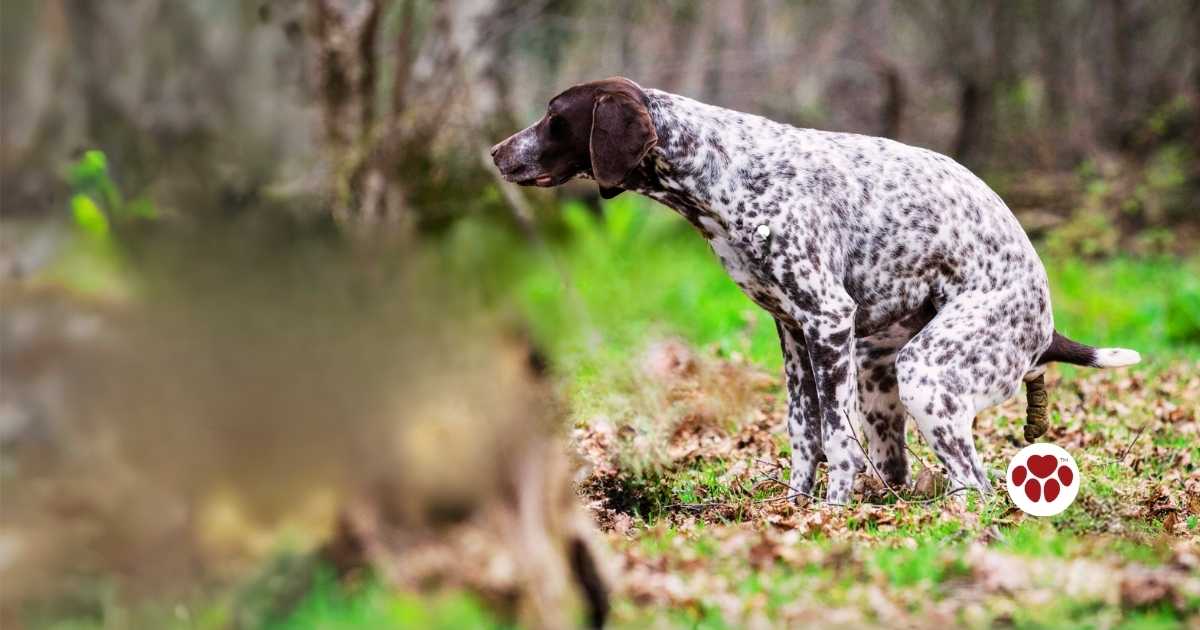
Decoding Dog Black Poop
|
|
Time to read 8 min
|
|
Time to read 8 min
Have you ever been concerned about the color of your dog's poop? It's not something most pet owners like to discuss, but the color and consistency of your dog's feces can actually reveal a lot about their health. While it's normal for your dog's poop to vary in color depending on their diet, certain colors like black can be a cause for concern.
In this article, we will delve into the world of dog poop to decode the darkness and understand the meaning behind your dog's black poop. We’ll discuss:
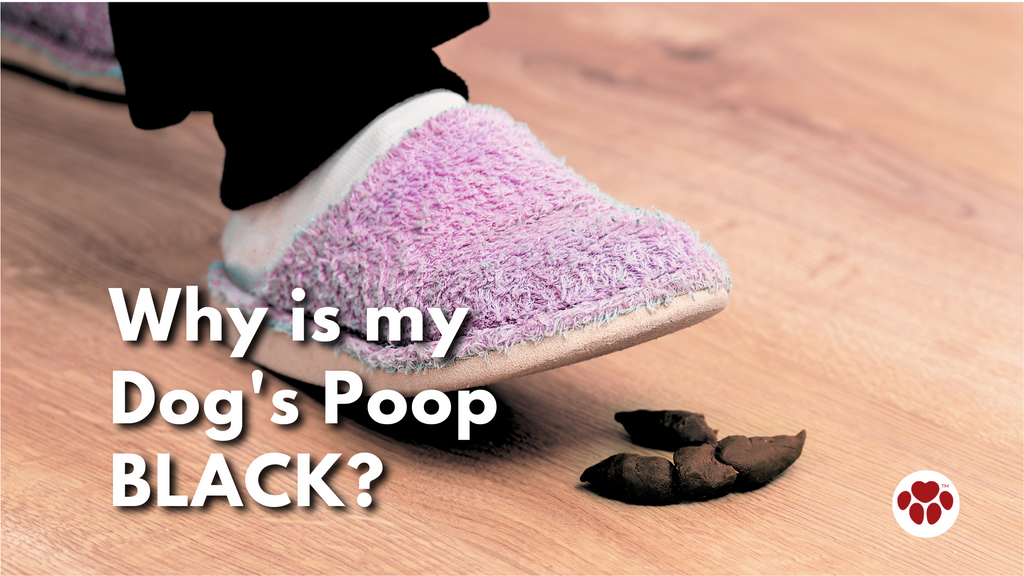
Black poop in dogs can indicate a variety of underlying issues, ranging from something as harmless as the food they ate to more serious conditions including internal bleeding, certain infections, or even a side effect of certain medications. By understanding what the color of your dog's poop means, you can better gauge their overall health and address any potential issues sooner rather than later.
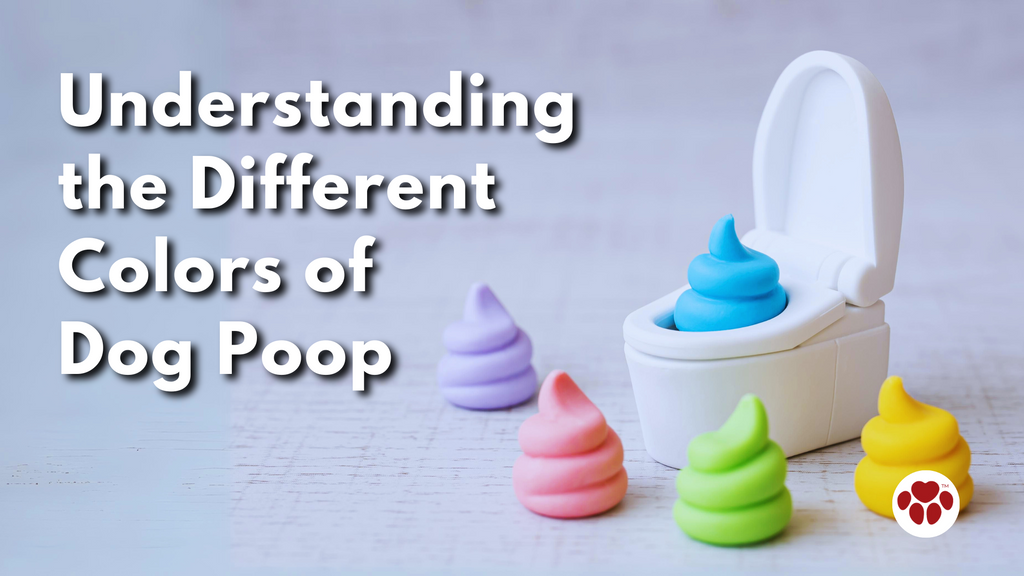
Dog poop comes in a variety of colors, and each color can provide valuable insights into your dog's health. While black poop may be alarming, it's important to consider other factors such as your dog's diet and any recent changes in their routine. Black poop is often caused by the presence of digested blood in the stool, which can be a sign of internal bleeding. However, it's essential to examine the texture, smell, and consistency of the stool to get a complete picture.
Dog poop can come in a variety of colors, each potentially indicating different health issues. Understanding what these colors mean can help you monitor your dog's health and take appropriate action when needed.
This can be a sign of incomplete digestion, or it could indicate the presence of foreign material (Elfenbein & Koehler, 2023). If your dog's poop is consistently yellow, it's best to consult with your veterinarian to rule out any underlying health conditions.
Green poop in dogs can be a result of consuming grass or other green vegetation (Lock & Barnette, 2024). In most cases, it's not a cause for concern unless your dog is also experiencing other symptoms such as diarrhea or vomiting.
If you notice blood in your dog's poop, it's important to seek veterinary attention immediately. This could be a sign of internal bleeding or a serious gastrointestinal issue (Fernandez & Morrison, 2023).
Black poop in dogs is often a cause for concern as it can indicate bleeding in the upper gastrointestinal tract. Black poop could be due to a variety of reasons, such as ingesting blood from a nosebleed or a more serious condition like an ulcer (Phillips, David, & Brenda, 2022). It's essential to investigate further if you notice your dog's poop is consistently black.
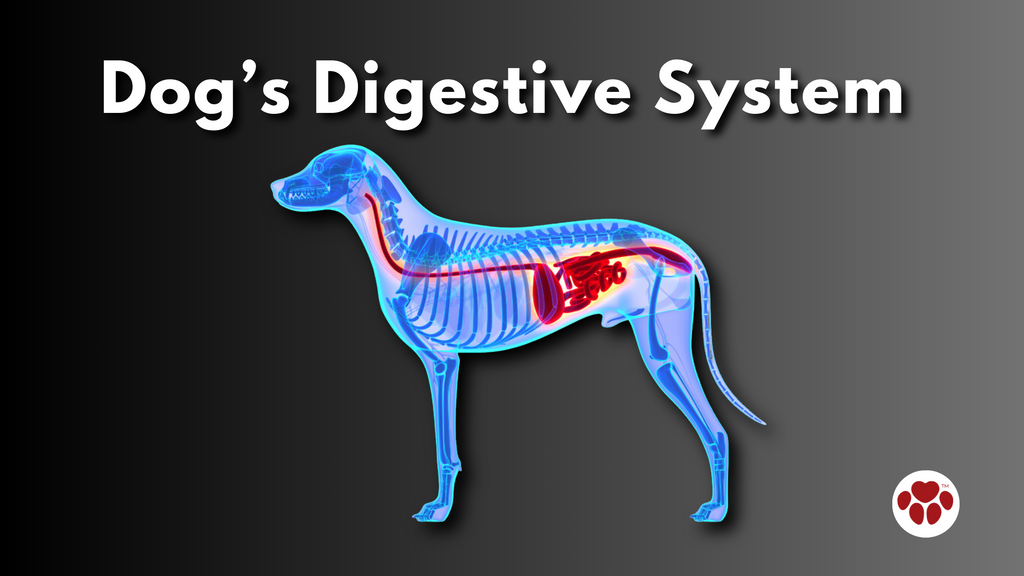
To understand why black poop can be a cause for concern, it's important to have a basic understanding of your dog's digestive system. The digestive system is responsible for breaking down food, absorbing nutrients, and eliminating waste. The digestive process begins in the mouth, where enzymes in saliva start breaking down food.
From there, the food travels down the esophagus and into the stomach, where it is further broken down by stomach acids. Next, the partially digested food enters the small intestine, where nutrients are absorbed into the bloodstream. Finally, the remaining waste passes through the large intestine and rectum before being expelled as poop.
The color of your dog's poop is primarily determined by the presence of bile, a substance produced by the liver that helps in the digestion of fats (Maldonado-Valderrama, J., Wilde, P., Macierzanka, A., & Mackie, A., 2011). When bile mixes with food waste, it gives the poop its characteristic brown color (Vogelsang & Jones, 2022).
However, when bleeding occurs in the upper digestive tract, the blood can mix with bile and turn the poop black. Knowing this, it becomes clear why black poop can be an indicator of internal bleeding or other serious health issues. It's crucial to pay attention to any changes in your dog's poop color to catch potential problems early on.
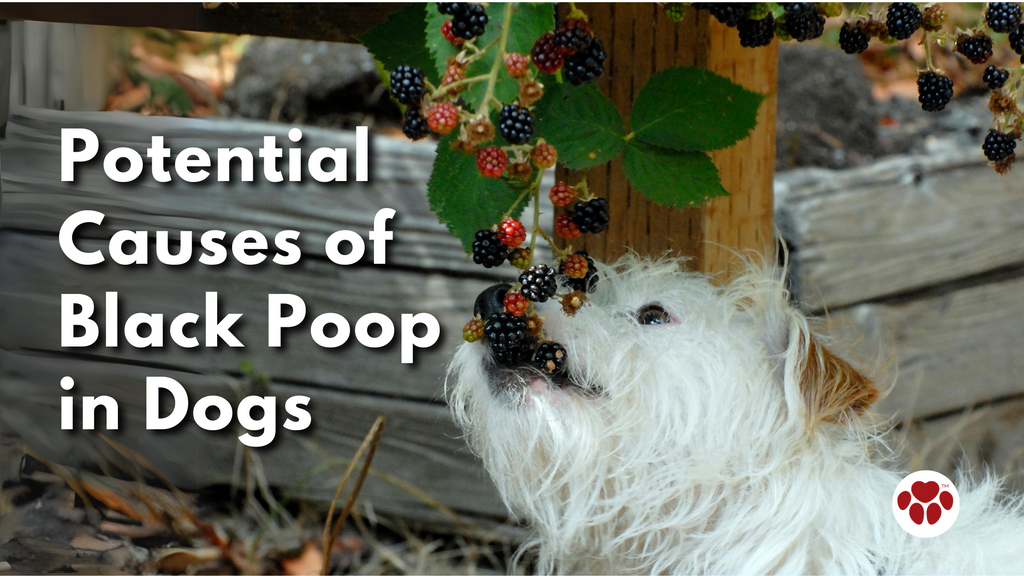
Black poop can be attributed to various factors, and it's essential to consider them all before jumping to conclusions. While some may be harmless and temporary, others can signify a more significant underlying issue. Here are some common causes to be aware of:
Certain foods can cause temporary changes in poop color. For example, if your dog consumes a large amount of blackberries or blueberries (Huzar, 2023), their poop may temporarily appear black. However, this should resolve within a day or two.
Some medications, such as iron supplements (Khatri, 2023) or certain antibiotics, can cause black poop as a side effect. If your dog is on any medications, it's essential to consult with your veterinarian to understand if this is a possible cause.
Black poop can be a sign of bleeding in the upper gastrointestinal tract, which can be caused by ulcers, tumors, or other conditions (Witter, 2021). It's crucial to identify the source of the bleeding to provide appropriate treatment.
Certain infections, such as parvovirus or certain types of parasites, can cause black, tarry stools in dogs (Witter, 2021). If your dog has recently been exposed to a potential infection, it's important to consult with your veterinarian for proper diagnosis and treatment.
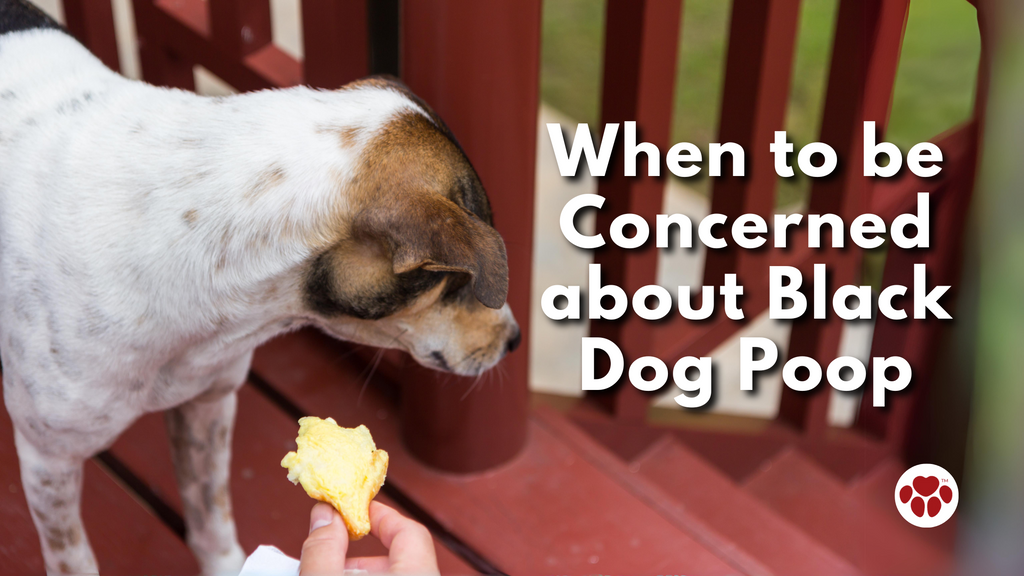
While black poop in dogs can have various causes, it's essential to know when it warrants immediate veterinary attention. Here are some signs to look out for:
If your dog's poop is consistently black over a period of several days, it's important to seek veterinary advice. Temporary changes in color may not be a cause for concern, but persistent black poop could indicate a more serious issue.
Pay attention to any accompanying symptoms such as vomiting, diarrhea, loss of appetite, or lethargy. These can be signs of a more significant health problem and should not be ignored.
If your dog's behavior has changed, such as a sudden decrease in energy or increased discomfort, it's crucial to consult with a veterinarian. Changes in behavior can often indicate underlying health issues.
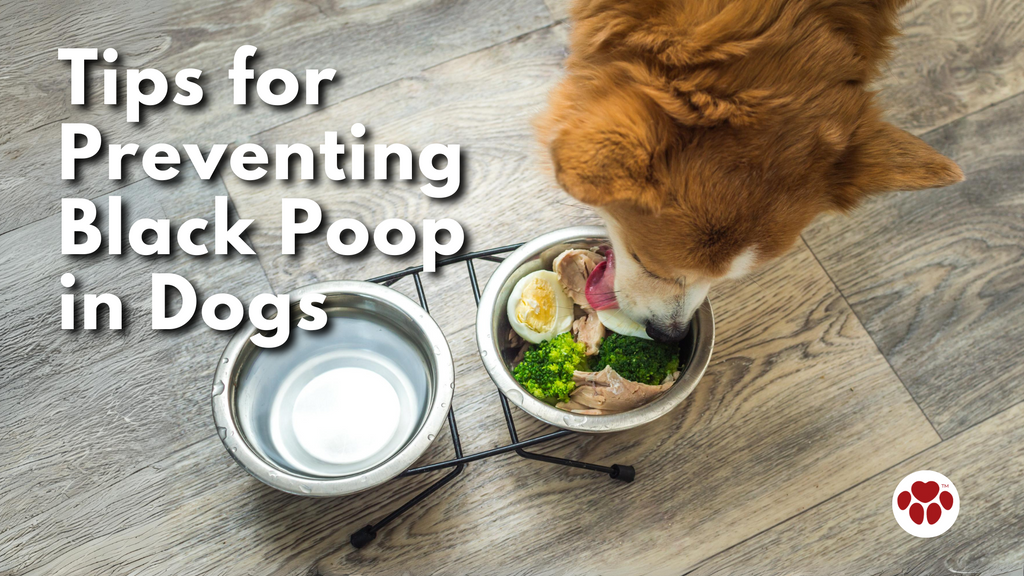
While some causes of black poop are beyond your control, there are steps you can take to promote your dog's overall digestive health and potentially prevent black poop. Here are some tips to consider:
Feed your dog a high-quality, balanced diet that meets their nutritional needs. Avoid feeding them human food or foods that may cause digestive upset.
While it's tempting to spoil your dog with treats, too many can disrupt their digestion. Limit treats to a reasonable amount and choose healthy options.
Ensure your dog has access to fresh, clean water at all times. Proper hydration is essential for maintaining a healthy digestive system.
Regular exercise helps promote healthy digestion and overall well-being. Make sure your dog gets enough exercise to keep their digestive system functioning optimally.
Routine veterinary check-ups are crucial for monitoring your dog's health and catching any potential issues early on. Your veterinarian can provide personalized advice based on your dog's specific needs.
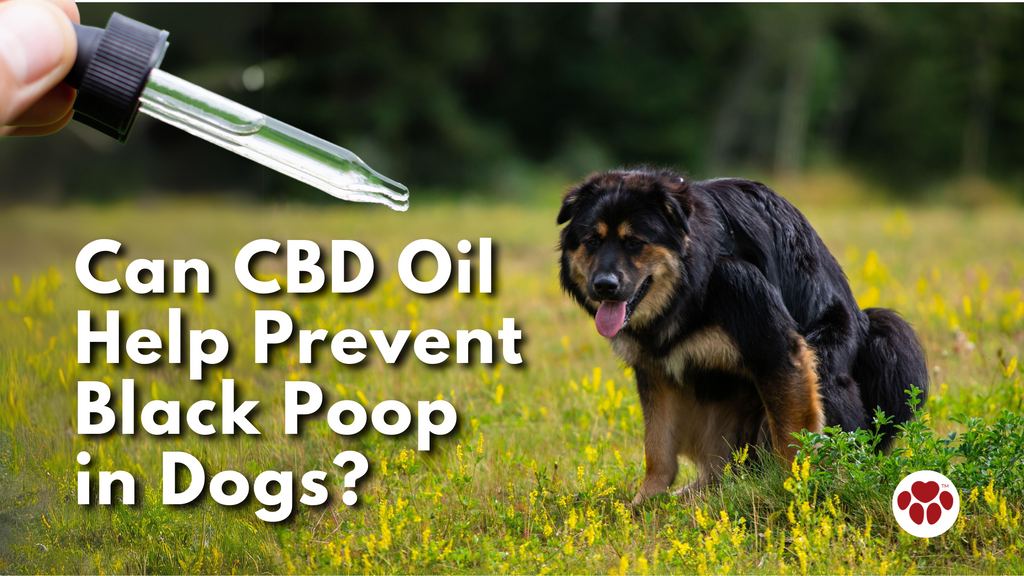
CBD oil has gained popularity as a natural remedy for various health issues in both humans and pets. While there is limited scientific research on the use of CBD oil for preventing black poop in dogs specifically, some pet owners have reported positive results.
CBD oil has been known to have anti-inflammatory properties, which could potentially help reduce inflammation in the digestive tract and prevent bleeding. A 2018 study of Irving, et al. showed that CBD-rich botanical extract may be beneficial for symptomatic treatment of ulcerative colitis, with improved quality-of-life and subjective symptoms.
However, it's important to consult with your veterinarian before introducing any new supplements or treatments to your dog's routine. They can provide guidance on the appropriate dosage and whether CBD oil, such as CBD Full-Spectrum Happy-Furever Oil, is suitable for your dog's specific needs. Read "CBD Dosage Chart for Dogs".
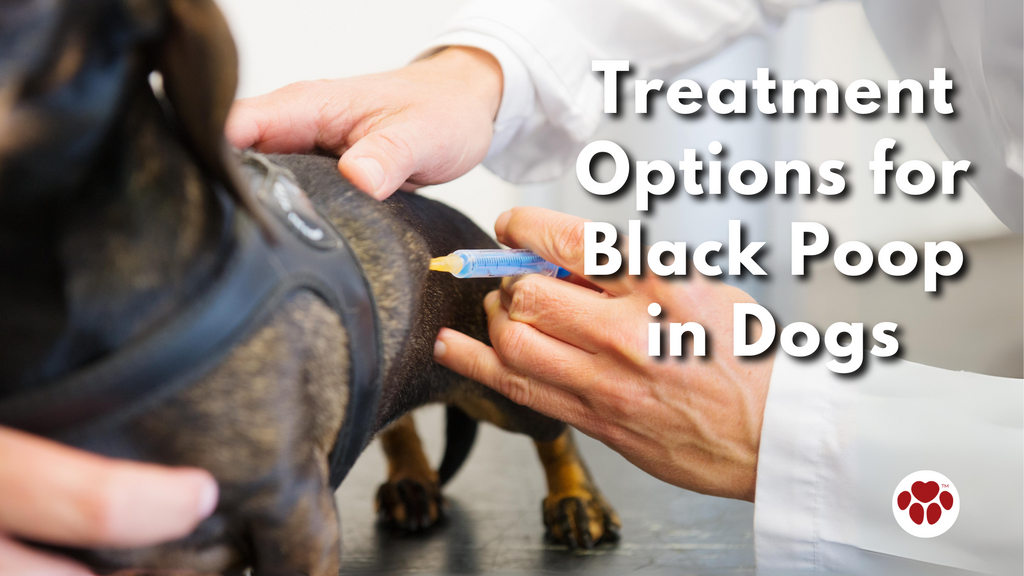
The treatment for black poop in dogs depends on the underlying cause. Your veterinarian will need to conduct a thorough examination and possibly run additional tests to determine the best course of action. Some potential treatment options may include:
If your dog's black poop is a result of an infection or underlying health condition, your veterinarian may prescribe medication to address the issue. It's important to follow their instructions carefully and complete the full course of treatment.
In some cases, dietary changes may be recommended to help alleviate digestive issues and prevent further complications. Your veterinarian can provide guidance on the appropriate diet for your dog's specific needs.
In more severe cases, such as when there is a tumor or ulcer causing the bleeding, surgical intervention may be required. Your veterinarian will discuss the options with you and recommend the best course of action.
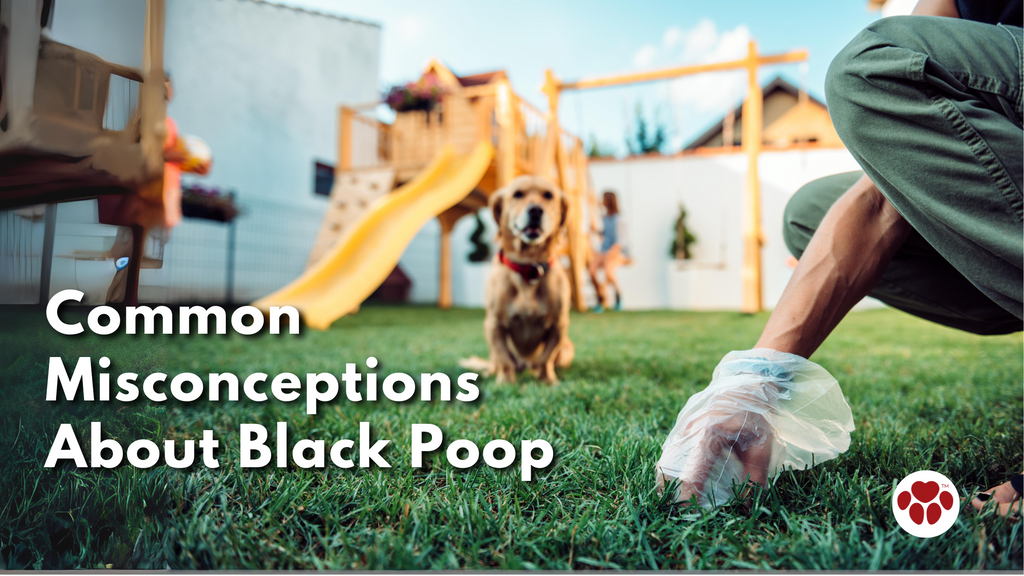
When it comes to black poop in dogs, there are several misconceptions that can lead to confusion. Here are a few common myths debunked:
While black poop can indicate a serious health issue, it's not always a cause for panic. Temporary changes in poop color due to diet or medication can resolve on their own.
While black poop can be an indicator of bleeding in the upper gastrointestinal tract, it's not the only possible cause. It's important to consult with your veterinarian to determine the underlying cause of the black poop.
While some dogs may occasionally have black poop due to harmless factors like food or medication, consistent black poop is not considered normal and should be investigated further.

If your dog is consistently passing black poop or exhibits other concerning symptoms, it's crucial to consult a veterinarian. They will be able to conduct a thorough examination, run diagnostic tests if necessary, and provide the appropriate treatment plan for your dog's specific needs. Remember, your veterinarian is your best source of information and guidance when it comes to your dog's health, so don't hesitate to reach out to them.
In conclusion, the color of your dog's poop can provide valuable insights into their overall health. While black poop may be alarming, it's important to consider other factors such as diet, recent changes in routine, and accompanying symptoms.
By understanding the potential causes and seeking veterinary advice when necessary, you can ensure that your dog stays happy and healthy. So the next time you come across your dog's black poop, don't panic. Instead, use it as an opportunity to decode the darkness and take proactive steps towards their well-being.